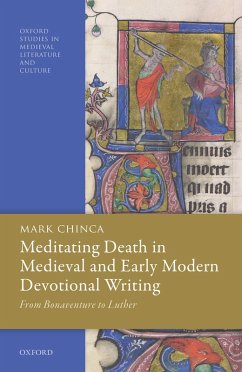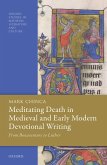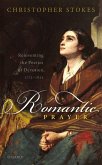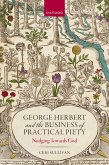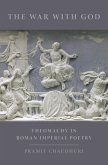The monograph series Oxford Studies in Medieval Literature and Culture showcases the plurilingual and multicultural quality of medieval literature and actively seeks to promote research that not only focuses on the array of subjects medievalists now pursue?in literature, theology, and philosophy, in social, political, jurisprudential, and intellectual history, the history of art, and the history of science?but also that combines these subjects productively. It offers innovative studies on topics that may include, but are not limited to, manuscript and book history; languages and literatures of the global Middle Ages; race and the post-colonial; the digital humanities, media and performance; music; medicine; the history of affect and the emotions; the literature and practices of devotion; the theory and history of gender and sexuality, ecocriticism and the environment; theories of aesthetics; medievalism. Meditating about death and the afterlife was one of the most important techniques that Christian societies in medieval and early modern Europe had at their disposal for developing a sense of individual selfhood. Believers who regularly and systematically reflected on the inevitability of death and the certainty of eternal punishment in hell or reward in heaven would acquire an understanding of themselves as a unique persons defined by their moral actions; they would also learn to discipline themselves by feeling remorse for their sins, doing penance, and cultivating a permanent vigilance over their future thoughts and deeds. This book covers a crucial period in the formation and transformation of the technique of meditating on death: from the thirteenth century, when a practice that had mainly been the preserve of a monastic elite began to be more widely disseminated among all segments of Christian society, to the sixteenth, when the Protestant Reformation transformed the technique of spiritual exercise into a bible-based mindfulness that avoided the stigma of works piety. It discusses the textual instructions for meditation as well as the theories and beliefs and doctrines that lay behind them; the sources are Latin and vernacular and enjoyed widespread circulation in Roman Christian and Protestant Europe during the period under consideration.
Dieser Download kann aus rechtlichen Gründen nur mit Rechnungsadresse in A, B, BG, CY, CZ, D, DK, EW, E, FIN, F, GR, HR, H, IRL, I, LT, L, LR, M, NL, PL, P, R, S, SLO, SK ausgeliefert werden.

